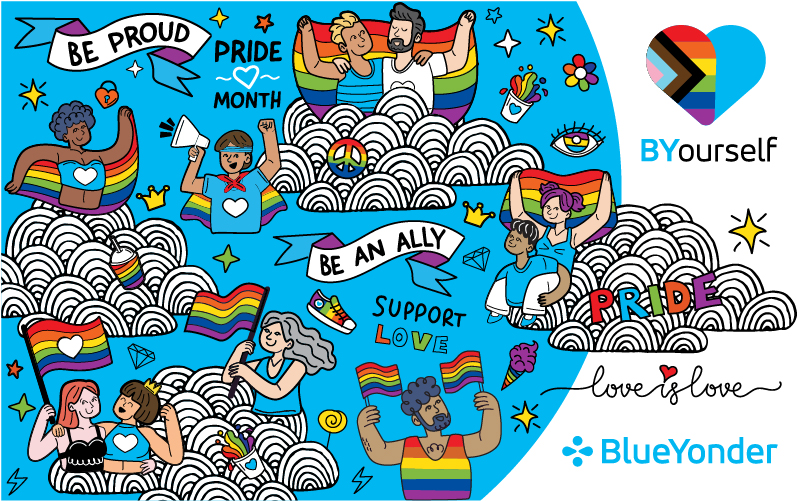“So, What’s Our Last Name?” Weighing the Options In a Same-Sex Marriage
June is Pride Month. This week’s DIVE In blog is written by Holly Stanford, Digital Campaign and Account Based Marketing Specialist at Blue Yonder.
I’m getting married at the end of June — what a way to end Pride Month! Throughout my engagement, I’ve been faced with a number of decisions — including debating whether or not to change my last name. Do we keep our own? Do we have a hyphenated or double surname? Do we choose one last name and continue a family tradition (although as a same-sex couple, tradition isn’t exactly set up for us)? We’ve decided to do lots of things that aren’t traditional — we’ve both seen each other’s wedding dresses, we’re getting ready together, and we’re walking down the aisle together. What are our options? What do we want to do? So, I got googling.
Option 1: Creating a Brand New Last Name
Merging two last names together is an idea that some couples find appealing. This one I admit I toyed with because it sounded really fun. A new family name, a fresh start based on our union. For example, Smith and Jones could become Smones or Jonith. Many see this as representative to their marriage and intertwining their lives. “Stansted” was our attempt, but I didn’t fancy saying, “Stansted, like the airport,” every time I did my personal admin. Another possibility is exploring family history to uncover a meaningful, long-lost surname. A friend of mine, for instance, reclaimed their Irish surname that had been changed when their ancestors immigrated to the UK. Alternatively, some people might opt for a completely new surname, one that holds special significance and is unique to their relationship.
Option 2: Keeping Our Own Last Names
Some LGBTQ+ couples decide to keep their own last names. Maybe they really like their names and have formed their identities around them. Perhaps the admin hassle (passports, driving licenses, even the dog’s last name at the vet) isn’t worth it. I have a friend whose last name is very similar to their partner’s, so they didn’t see the point in changing. Some people keep their own last name because of its history, viewing name changing as old-fashioned and patriarchal.
Option 3: Taking One Name
Of course, this is the more “traditional” route. Although some people see taking one name as old fashioned, others see it as adapting a longstanding tradition in a progressive way. Sometimes, it’s as simple as one partner having a nicer sounding name! For those who might not have had the most accepting families, being welcomed into a new one can be a significant step in their own coming out journey and a part of their healing.
“So, Who Gets to Keep Their Last Name?”
“Who gets to keep their last name?” is something I’ve been asked before, and to me, it’s not a matter of “who gets” — it’s not a set-rule scenario, and it’s not a way of losing one’s identity to another. As part of the LGBTQ+ community, we haven’t always had the freedom to choose due to the societal, historical, or traditional pressure of the past but now we have that ability. I feel very grateful that I even get to navigate these choices since same-sex marriage was legalized in the UK just over 10 years ago. As a teenager, I wouldn’t have thought it possible. For me and my fiancée, it’s a personal decision between the two of us, with no right or wrong answer — just what suits us best. It’s an exciting decision, with so many options, which symbolizes a start to a long life of decision-making together.
During this year’s month of Pride, I want to congratulate all couples celebrating their partnerships whether through marriage, civil unions, or other meaningful ceremonies. And of course, it’s crucial to acknowledge that in some countries and regions, same-sex marriage remains unrecognized by law. To those couples, I want to emphasize that your love is just as meaningful, valued, and deserving of celebration. Happy Pride!

